
Bates College is the No. 1 producer of Fulbright Student awards among U.S. liberal arts colleges in 2020, The Chronicle of Higher Education announced today.
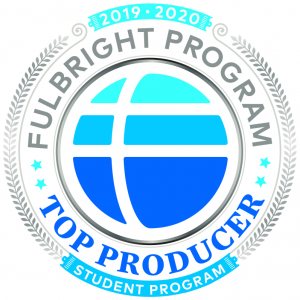
A perennial Top Producer of Fulbrights, Bates has received the most Fulbright Student awards among U.S. liberal arts colleges twice in the last three years.
With 24 young alumni engaged in Fulbright-sponsored teaching and research experiences worldwide, Bates tops all U.S. bachelors’ colleges — including the most selective liberal arts institutions — for the second time in three years.
The college’s two dozen Fulbright Student awards in 2020 are the most ever by a U.S. liberal arts college.
“This extraordinary accomplishment is the result of a genuine team effort — beginning with the talent and creativity of our student candidates, the generosity and diligence of their faculty mentors, the leadership of our program director, and the efforts of many other members of our community,” said Bates President Clayton Spencer.
“Fulbright recognizes that our students are deeply curious, concerned about the defining issues of our time, and already emerging as ethical and effective leaders committed to living lives of meaning and contribution.”
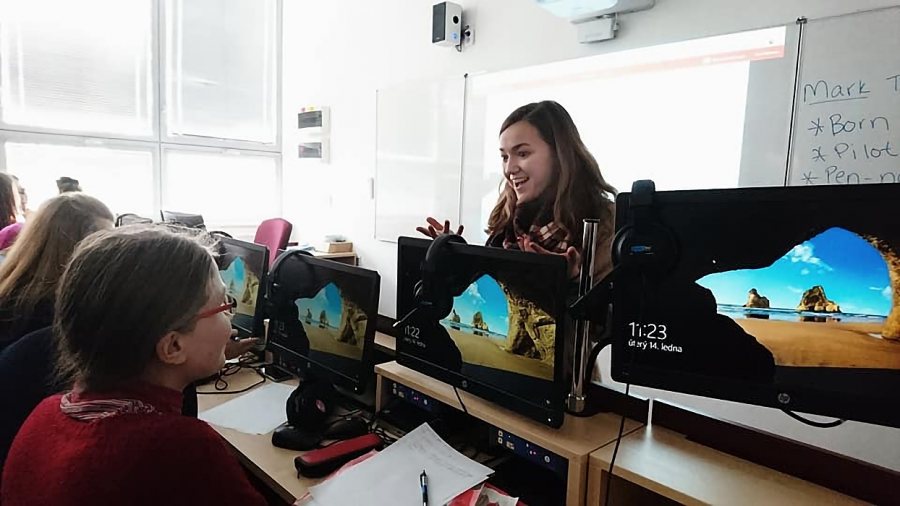
Sarah Rothmann ’19, with a Fulbright English Teaching Assistant award in the Czech Republic, teaches her students about The Adventures of Tom Sawyer and the art of Mark Twain’s aphorisms. (Photograph by Kristyna Dzmuranova)
Sponsored by the U.S. Department of State, the Fulbright is the U.S. government’s flagship international educational exchange program. The highly competitive program sends Americans to dozens of countries to teach, study, or conduct research, promoting cultural exchange and international understanding, and finding solutions to shared concerns.
Recognized as a Fulbright Top Producer for nine straight years, Bates has seen a sharp rise in the number of Fulbright Student grants awarded, from six in 2013 to the record-setting 24 this year.
+24 Fulbrights, 18 countries
18 countries are represented by Bates’ 24 Fulbright Student award recipients in 2020.
For 2020, five of Bates’ 24 Fulbright awardees received research grants and the balance received English teaching assistant awards. Of the awardees, 19 are 2019 graduates and five are young alumni of the last several years.
Australia
Brazil (2)
Canada
Colombia (2)
Czech Republic
Germany (3)
India
Indonesia
Ivory Coast
Luxembourg
Malaysia
Morocco
Nepal
Peru
Senegal
South Korea
Spain (3)
Uganda
Central to Bates’ Fulbright success — and a distinctive element of the overall Bates experience — are wide-ranging opportunities for highly talented students to develop one-on-one mentoring relationships with faculty and staff, said Robert Strong, lecturer in English and the college’s director of national fellowships.
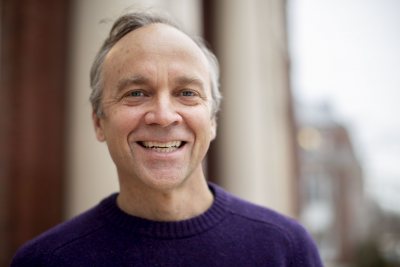
Robert Strong is a lecturer in English and director of national fellowships at Bates. (Phyllis Graber Jensen/Bates College)
“Bates students are talented, curious, and eager to understand the world and their place in it, which makes them strong Fulbright candidates already, as well as set up for success in any endeavor,” Strong said.
“It’s amazing what Bates faculty and staff will then do to help them grow intellectually and personally, and to help them identify their interests and goals.”
Such mentorship can take the form of small classes, experience in cutting-edge research, collaboration in extracurricular activities, and senior thesis advising.
In turn, the power of mentoring is built into the Bates fellowship application process. As students prepare their applications, each Fulbright hopeful participates in an intensive interview with a faculty and staff committee. Feedback from these sessions helps students refine and better articulate their goals.

Eden Rickolt ’20 (right) of Landenberg, Pa., now applying for a 2020–21 Fulbright, poses with her Fulbright mentor, Carolina González Valencia, assistant professor of art and visual culture, in Rickolt’s visual art thesis studio in the Olin Arts Center. (Phyllis Graber Jensen/Bates College)
For the past several years, Strong said, these committees have included a faculty or staff mentor who knows the individual applicant well. Their presence helps both committee and student add valuable depth to fellowship applications.
“Often the application mentor can ask a question that draws out something about the applicant, about their background or scholarly interest, that we had no idea about,” Strong said. “It’s very helpful.”
Mentorship infuses other Bates experiences that help to create strong Fulbright applications, from the centrality of senior thesis projects to the availability of education and community-engaged courses in Lewiston, which is home to a large community of immigrants from African nations — all of which prepare Fulbright recipients to have important intercultural exchanges around the world.
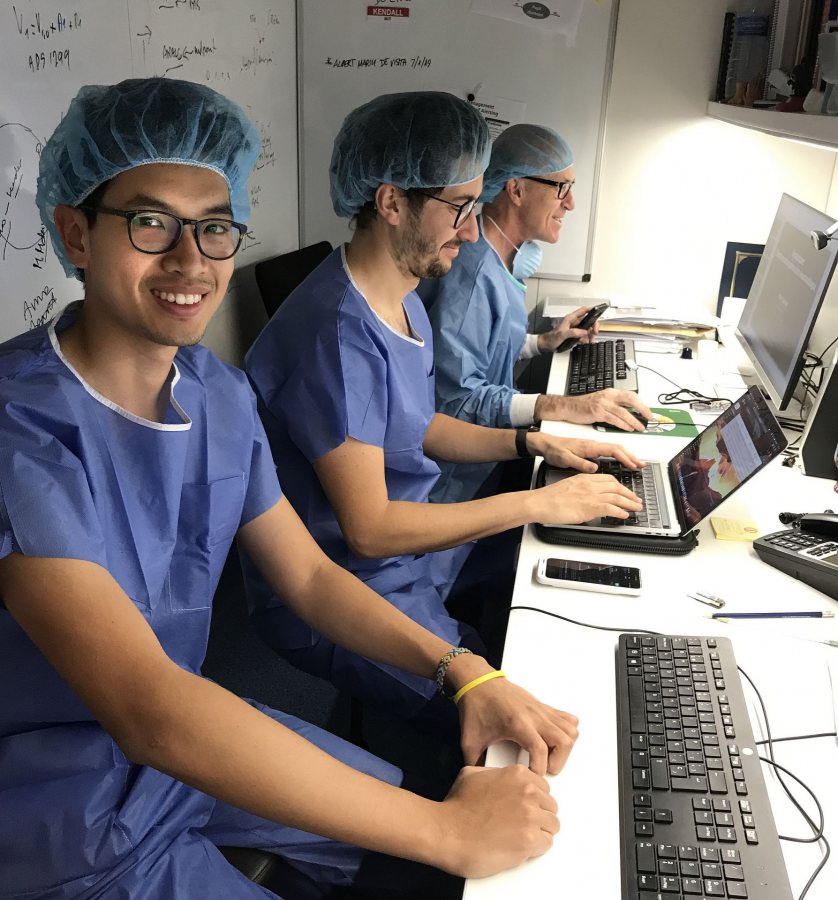
Fulbright Student awards often put young Bates alumni into the mix of important international research. Here Andrew Chen ’19 (left) is using his Fulbright research grant to study with the Neuroimmunologic Response to Surgical Aggression and Anesthesia laboratory in Barcelona, Spain. At center is Dr. Sergio Vide, a lab collaborator, and at right is Dr. Pedro Gambús, the lab’s principal investigator. Chen is investigating how certain patients may be predisposed to adverse outcomes after receiving anesthesia. (Photo courtesy Andrew Chen ’19)
Also supporting the college’s Fulbright success is the college’s robust off-campus study program. More than half of Bates students study abroad, often on programs that center around their budding research interests.
“Students come back totally on fire with their new academic interest and they find me, saying, ‘I just did this and I want to keep doing it,’” Strong said.
The combination of resources, opportunities, and individualized application support leads each year to tremendous Fulbright success — but even if the application is not successful, Strong said, applying for the fellowship benefits the applicants.
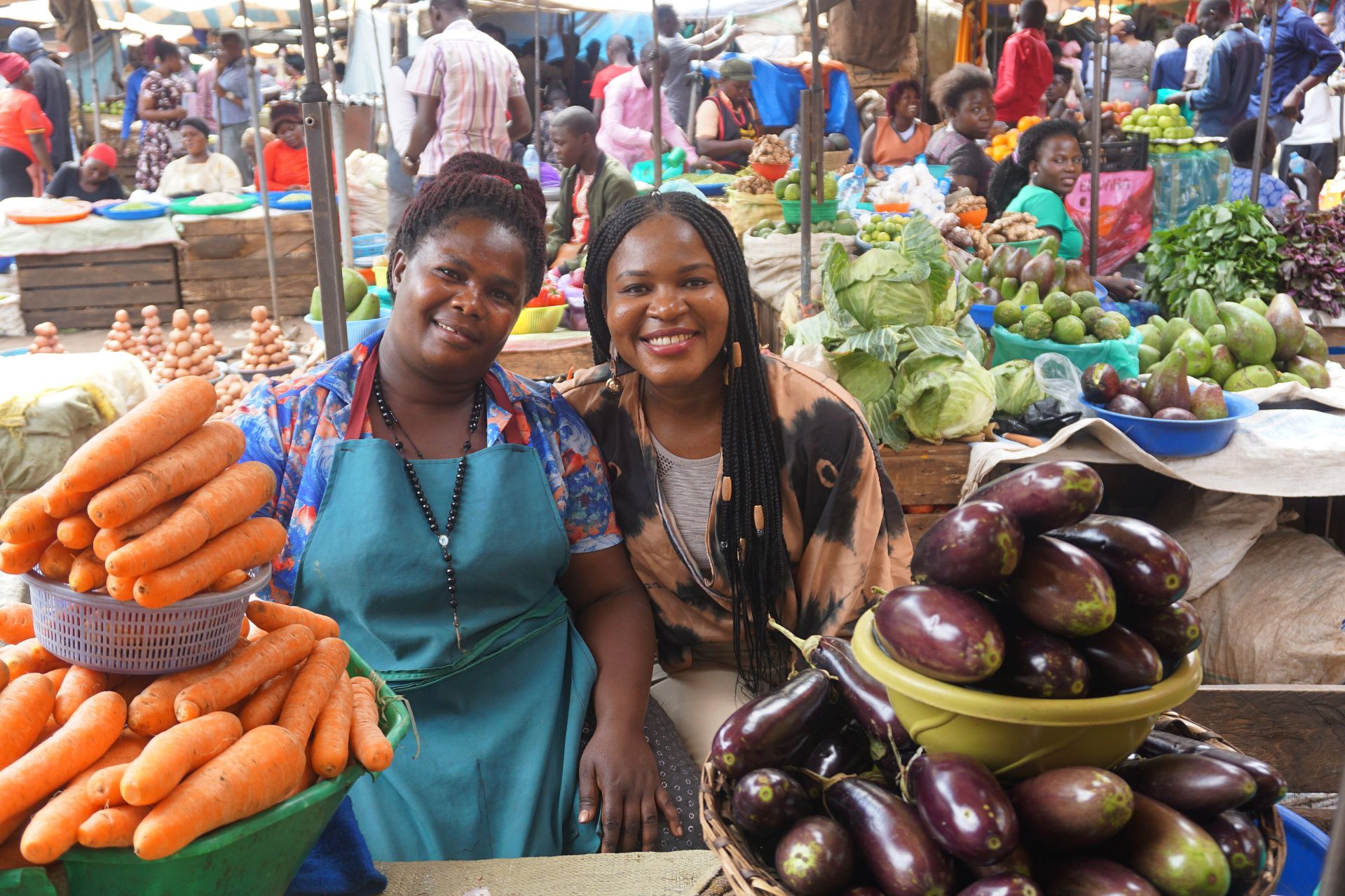
Linda Kugblenu ’13 (right), who has a Fulbright Student research award in Uganda, poses with Dorothy, an entrepreneur who sells fruits and vegetables in the Nakasero Market in Kampala. Kugblenu is leading focus groups with female entrepreneurs to explore savings and credit cooperatives, or SACCOs, which are significant drivers in the mobilization of women to acquire capital, invest in businesses, and become financially stable.
“It’s an intensive process of thinking about your goals,” he said. “What do you want to do? How do you best approach it? Who’s your audience for this application, and how do you address them? They’re prepared to do it again in job interviews and in future fellowship applications.”
Strong points to Jenna Armstrong ’15, a newly minted Gates Cambridge Scholar, and recent Marshall scholar Chris Crum ’15 as alumni who were unsuccessful Fulbright applicants yet went on to earn highly prestigious and competitive fellowships.
“Very often, once you put your goals down on paper, they cohere in your mind in a way that helps you think about them more thoroughly.”


